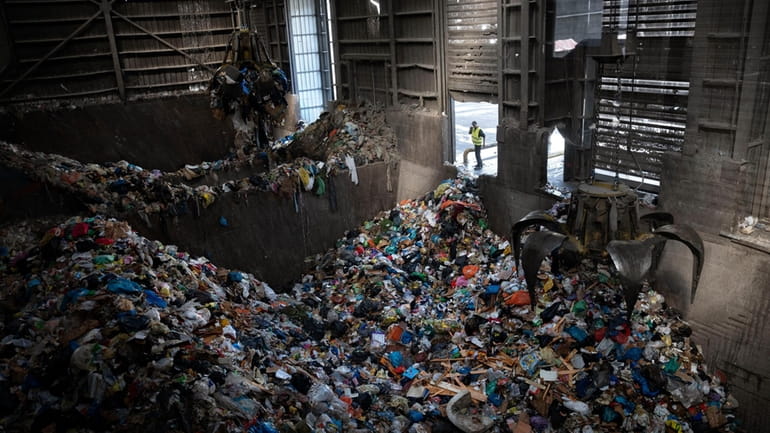Link between plastic and heart attacks shows it's time to reduce packaging and its chemicals

Cranes lift waste, mostly plastic and paper at a recycling plant. Credit: AP/Oded Balilty
This guest essay reflects the views of former EPA regional administrator Judith Enck, president of Beyond Plastics and a professor at Bennington College.
Plastic has now been linked to increased risk of heart attack, stroke, and premature death in humans. At what point will policymakers realize this material — which lingers for centuries and is made with chemicals known to be toxic to humans — is as much a threat to human health as it is to the planet?
Plastic pollution entered our daily lives in the 1950s as single-use plastic like grocery bags, bottles, utensils, and food packaging began sullying our streets, parks, streams, beaches, and eventually the ocean. Recently, it’s become much more than just an environmental issue. Plastic has infiltrated our food, water, air, soil, and yes, even our bodies. It’s been found in human blood, lungs, breast milk, placentas, and more.
A March study in the New England Journal of Medicine found tiny plastic particles in human arteries — specifically the carotid arteries, which supply blood to the brain. That’s not the worst of it: Patients with plastic-tainted arteries were nearly five times more likely to suffer from a cardiovascular event like heart attack or stroke.
Still, the chemical additives in plastic are arguably more concerning. They have been associated with cancer, nervous system damage, hormone disruption, and fertility issues, just to name a few.
Over 16,000 chemicals are used in plastic to give it color, pliability, durability, fire resistance, and more. Of those, at least 4,200 are considered “highly hazardous” to human health and the environment. Thousands more haven’t even been tested for toxicity. Because these additives aren’t tightly bound to plastic, they can leach into our food and beverages from their plastic packages, especially when heated.
We don’t need another 50 years of research to confirm that ingesting a nonbiodegradable, inorganic material made with toxic chemicals is a risk to human health. Our plastic exposure will only expand in the future — plastic production is expected to triple by 2060.
Inaction is no longer an option. Fortunately, New York state lawmakers are considering a transformational piece of public policy. If adopted, the Packaging Reduction and Recycling Infrastructure Act would be the most sweeping packaging reduction law in the world, cutting plastic packaging in half over the next 12 years. After reduction, the remaining packaging must be reusable or recyclable.
This part alone is monumental, but the bill also requires some of the most toxic chemicals used in packaging to be eliminated. It would prohibit the use of PFAS (known as “forever chemicals”), lead, mercury, bisphenols, formaldehyde, vinyl chloride, and other chemicals in packaging — chemicals you probably didn’t know were in the plastic covering your food and drinks.
The legislation also would make a sizable dent in the nation’s plastic production and use, given New York’s ranking as the fourth-largest state in the country. If enacted, this bill would set a blueprint for other states to adopt.
New York legislators should remember this is an election year, and voters want to see effective policies to reduce plastic pollution. A 2022 poll found that 88% of people registered to vote in New York are concerned about single-use plastic products and support local and state policies to reduce single-use plastic.
We need Assembly Speaker Carl Heastie and State Senate Majority Leader Andrea Stewart-Cousins to bring the Packaging Reduction and Recycling Infrastructure Act to the floor for a vote. Our health, and the planet’s health, are at stake. We have no more time to waste on waste.
THIS GUEST ESSAY reflects the views of former EPA regional administrator Judith Enck, president of Beyond Plastics and a professor at Bennington College.
